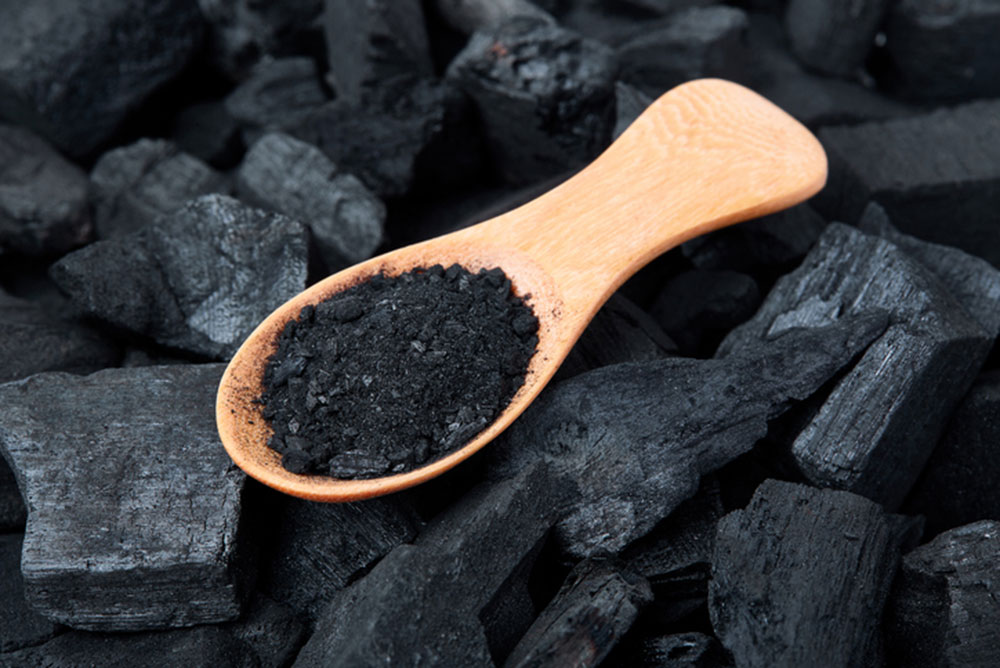
iStock
IT ALL BEGAN with my search for a plastic-free toothbrush, inspired by Catherine Clifford’s “plastic purgery“story. That quest led me to bamboo toothbrushes and then to bamboo brushes with black bristles “infused” with charcoal, which sounded appealing because black wouldn’t look dull or dirty.
From there, I found charcoal products for personal use popping up all over the place: charcoal-whitening toothpastes, black-charcoal lemonade at juice bars, charcoal capsules to treat stomach bugs in addition to detoxing and calming gas, charcoal skin cleansers and charcoal air fresheners and shoe deodorizers.
Most of these products use “activated” charcoal, made from various materials—coal, peat, petroleum, coconut shells and wood (bamboo or oak)—that are exposed to intense heat or steam along with chemicals to remove non-carbon materials. What remains looks like black dust, with many nooks and crannies that greatly expand the surface area compared to ordinary coal and make activated charcoal powerfully absorbent.
“In theory, the black sludge binds to everything in its path–stains, tartar, bacteria, viruses (and maybe even your tonsils),” New York area cosmetic dentist Peter Auster told Harper’s Bazaar. “As it takes tartar off the teeth, your teeth will get whiter, which is a positive, of course, but it may also bind to medications that the body needs to absorb and even bacteria that you need for digestion. And additionally, it just might not work.”
Besides removing medications and “good” bacteria, charcoal can bind to and absorb essential nutrients from the gut, and it can permanently destroy tooth enamel. Side effects of ingesting charcoal include constipation and dehydration.
Use of activated charcoal is evidence-based and approved only for Emergency Room treatment of poisonings and drug and alcohol overdoses. Some doctors recommend keeping over-the-counter charcoal capsules on hand for emergencies, and some users claim it helps with hangovers. But because most charcoal-containing products are regulated as “foods”—rather than “drugs”—they are not required to be proven safe or effective before being sold, and ingredients can be unreliable. (Ingesting non-activated charcoal can be dangerous though it has proved helpful in emergency situations.)
At Baltimore’s Pure Raw Juice, black lemonade is in great demand. General Manager Adam Armstrong calls it a “super scrub for the digestive tract” and recommends it to customers with digestive ills, according to InStyle. “Activated Charcoal Elixir,” sold online by Luli Tonix, claims to cleanse the body, help with stomach issues and cure hangovers.
Biore Deep Pore Charcoal Cleanser—which looks foamy white–is said to draw out twice the dirt of a regular cleanser. And the Binchotan Charcoal Eye Mask promises to mitigate fatigue and emit infrared rays that improve blood circulation and quell headaches.
Back to teeth. My Magic Mud toothpaste, touted to whiten teeth and reduce tooth sensitivity, is used by holistic dentists and sold on Amazon in flavors like cinnamon clove. And a 2016 YouTube video showing a black charcoal mixture being smeared on teeth, posted by Mama Natural, attracted millions of viewers.
But Michigan dentist Susan Maples points to insufficient evidence of benefits, while the risks include stained, blotched teeth and enamel susceptible to erosion— which can make the teeth more sensitive as well as darker. Malaysians who applied charcoal and salt with their forefingers to clean their teeth had “distinct forms of abrasion” on the teeth, according to the journal Nature.
Incorporating binchotan—white charcoal made from special oak trees, used by Japanese chefs because it burns for longer periods without unpleasant odors—into black toothbrush bristles can prevent the growth of harmful bacteria and viruses, fend off halitosis and reduce plaque, according to enthusiasts. Like most toothbrusth bristles, however, these are made of plastic.
High-end black-brush bristles used on the Japanese company Morihata’s binchotan toothbrush claim specifically to draw out tannin (from coffee, tea, etc.) stains from the teeth—along with their antibacterial, antifungal and antiviral properties. For a glimpse of proliferating charcoal-based dental products, check out this site.
The only completely plastic-free brushes I found (such as those from Life without Plastic) use bristles made from Chinese pig hairs, which sounds very unappealing, especially for vegetarians. And wooden toothbrushes in general have the downsides of susceptibility to mold and handles that can splinter.
But as long as massive piles of plastic that will never biodegrade continue accumulating on the earth and there are islands of plastic floating on ocean currents, search for replacements must go on.
—Mary Carpenter
MyLittleBird’s well-being editor continues her search for non-plastic products. Read more of her posts right here.
